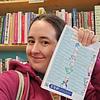Take a photo of a barcode or cover
Surprisingly disappointing. The premise is one I would usually be very interested in, and I enjoyed that it was clearly in the near future, but the structure/habit of referring to the characters by their relationship to one another (which doesn’t become clear for some time) was very frustrating and made for slow reading. Also a little too predictable at times.
Red Clocks follows five women, a biographer, a lady scientist, a 15 year old girl, unhappily married wife, and a forest-dwelling meander. Except for the scientist, all of them live in a small town in Oregon after the Personhood Amendment oder turns Roe v Wade, making IVF, abortion, and single-parent families illegal. This effects each of these women's lives, with the scientist showing that the sexism of the time is nothing new.
.
While difficult to read, the characters were real and whole and felt like a friend. They all had struggles and strife... And in the end they all were stronger and able to make empowering decisions for themselves. The end didn't make the world better... But the women found strength regardless - something we all need to hold on to - to remind us we all have control over ourselves even in the face of oppression.
.
While difficult to read, the characters were real and whole and felt like a friend. They all had struggles and strife... And in the end they all were stronger and able to make empowering decisions for themselves. The end didn't make the world better... But the women found strength regardless - something we all need to hold on to - to remind us we all have control over ourselves even in the face of oppression.
Red Clocks can be described as a dystopian novel, but it feels entirely contemporary. Instead of creating a far-off dystopian society, Leni Zumas picks up on trends in our current political climate and thinks them through. What are the consequences of making abortion illegal in the US? How does a woman trying to have a baby on her own navigate a world in which in vitro fertilization is banned and only married couples are allowed to adopt? Where do larger concepts of woman- and motherhood come into play when discussing women's health?
The author asks all these big questions in the grand scheme of things, while also maintaining a certain closeness to its four (arguably, five) main characters. She tells the story of multiple, very different women and weaves all these different narratives together beautifully. Another recent release that this book is destined to be compared to is The Power by Naomi Alderman, which I also read this year and really enjoyed, but which for me lacked a sort of emotional intimacy to its characters. Red Clocks however, reads like both a deeply intimate and emotional character study and a highly complex portrait of a near-future society. It's written incredibly lyrically and even though it's not necessarily a light read, I really enjoyed my time reading this!
--- Thank you to Little, Brown for sending me an advanced reader's copy of this book. All thoughts and opinions are entirely my own though (obviously!).
The author asks all these big questions in the grand scheme of things, while also maintaining a certain closeness to its four (arguably, five) main characters. She tells the story of multiple, very different women and weaves all these different narratives together beautifully. Another recent release that this book is destined to be compared to is The Power by Naomi Alderman, which I also read this year and really enjoyed, but which for me lacked a sort of emotional intimacy to its characters. Red Clocks however, reads like both a deeply intimate and emotional character study and a highly complex portrait of a near-future society. It's written incredibly lyrically and even though it's not necessarily a light read, I really enjoyed my time reading this!
--- Thank you to Little, Brown for sending me an advanced reader's copy of this book. All thoughts and opinions are entirely my own though (obviously!).
The only word I can think of to describe this book is interesting. Because it was. It was a fascinating look at four women’s lives and the challenges they went through. Did it have the emotional punch I was looking for? No. There didn’t seem to be any real urgency in the book aside from the daughter and the biographer’s points of view. There was a lot hinted at that could have been a gold mine had it been explored further in the mender’s points of view—such a sexuality and how that played a role in this dystopian universe—but the author cast aside in favor of rather disturbing descriptions that really didn’t add up to a whole lot other than the book’s rather weak theme of “women continue long after they’re gone.” And as for “the wife”—she honestly just annoyed the crap out of me. She really served no purpose other than to complain about her asshole of a husband and her rather awful kids. Her struggle was real enough, but it felt out of place with the rest of the story.
I rather liked the way this story was told from a slightly removed perspective and didn’t personalize the women with names. For me, that hammered home the fact that this is how society sees women as a whole—not as individuals with names and hopes and dreams, but only as “single, childless, biographer” or the possession of someone else “ie the daughter or the wife.” This fit in nicely with the all too real scenario the author put into place with the 28th amendment that denied women control over their bodies. That part was a bit too realistic for me and frankly terrified the shit out of me, because of how close we are to having that as our reality.
I wouldn’t go as far to say that I loved this book—it’s probably not one I will read again—but it was definitely interesting and worth the read.
I rather liked the way this story was told from a slightly removed perspective and didn’t personalize the women with names. For me, that hammered home the fact that this is how society sees women as a whole—not as individuals with names and hopes and dreams, but only as “single, childless, biographer” or the possession of someone else “ie the daughter or the wife.” This fit in nicely with the all too real scenario the author put into place with the 28th amendment that denied women control over their bodies. That part was a bit too realistic for me and frankly terrified the shit out of me, because of how close we are to having that as our reality.
I wouldn’t go as far to say that I loved this book—it’s probably not one I will read again—but it was definitely interesting and worth the read.
dark
emotional
tense
medium-paced
I really enjoyed this look at our near future. Pass the wine, plz.
Really easy-to-read book. Don’t go into it like I did thinking it’s some horrid dystopian future like The Handmaid’s Tale (although a world where abortion is illegal is pretty dystopian). It’s a very mild book, and to be honest it doesn’t read much different from the story of a person in the middle of Texas who lives hundreds of miles away from a clinic. I was hoping for a book that showed the impacts of illegal abortion and a Pink Wall much more deeply than this.
With that being said, it was still a good book. It did feel very trope-y at times—of course The Mender is some strange woman who lives in the woods with twigs in her hair, smelling like onions. And of course The Daughter who needs the abortion is the Smart Girl with So Much Potential. But the story was interesting and it held my attention, so four stars.
With that being said, it was still a good book. It did feel very trope-y at times—of course The Mender is some strange woman who lives in the woods with twigs in her hair, smelling like onions. And of course The Daughter who needs the abortion is the Smart Girl with So Much Potential. But the story was interesting and it held my attention, so four stars.
I have to admit that this is quite a problematic read for me. I mean, the topic and premise are interesting, bold, and very relevant with current issues, but I find it hard to relate with the characters.
The plot was told in four (five?) perspectives of women. In each of their chapter, they are all called not by their names but rather with a noun: the biographer, the wife, the daughter, and the mender (also the explorer, but I find it hard to accept it as a whole PoV because it was from the manuscript written by the biographer). I guess the way they are repeatedly called by their “role” is how Zumas want to show how women are viewed by the society: by their role. But it was done roughly so that instead of giving that “big picture” sensation, I just find the characters are distant. I also don’t find the character development to be much discussed in the whole plot.
The plot was told in four (five?) perspectives of women. In each of their chapter, they are all called not by their names but rather with a noun: the biographer, the wife, the daughter, and the mender (also the explorer, but I find it hard to accept it as a whole PoV because it was from the manuscript written by the biographer). I guess the way they are repeatedly called by their “role” is how Zumas want to show how women are viewed by the society: by their role. But it was done roughly so that instead of giving that “big picture” sensation, I just find the characters are distant. I also don’t find the character development to be much discussed in the whole plot.
This was a beautiful story that hits too close to home. I found a piece of myself in all five of the women. I love how varied they were, these women were fleshed out characters, nothing like each other. I loved how we could see how society controls them in various ways, and how they break free from that control to live their best life.




